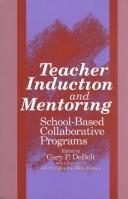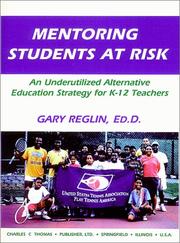| Listing 1 - 4 of 4 |
Sort by
|

ISBN: 1438400713 0585088225 9780585088228 9780791411353 0791411354 9780791411360 0791411362 0791411354 0791411362 Year: 1992 Publisher: Albany : State University of New York Press,
Abstract | Keywords | Export | Availability | Bookmark
 Loading...
Loading...Choose an application
- Reference Manager
- EndNote
- RefWorks (Direct export to RefWorks)

ISBN: 0398082758 9780398082758 039806833X 9780398068332 Year: 1998 Publisher: Springfield : Charles C Thomas,
Abstract | Keywords | Export | Availability | Bookmark
 Loading...
Loading...Choose an application
- Reference Manager
- EndNote
- RefWorks (Direct export to RefWorks)
Research clearly shows that mentoring is a powerful alternative education (dropout prevention) strategy for students at risk, and this text meets a demand from teachers and case workers in the juvenile justice systems for a comprehensive guide to establish mentoring programs. The book is teacher-friendly, easy to read, positive, and full of suggestions. The mentor application, interest inventories, and evaluation forms make it useful as a resource book. Strategies on writing mission statements, goals, and objectives contribute to confidence in developing successful proposals to fund mentoring
Children with social disabilities -- Education -- United States. --- Dropouts -- United States -- Prevention. --- Mentoring in education -- United States. --- Youth with social disabilities -- Education -- United States. --- Children with social disabilities --- Youth with social disabilities --- Mentoring in education --- Dropouts --- Education --- Prevention
Book
ISBN: 9462099936 9462099952 9462099944 Year: 2015 Publisher: Rotterdam, Netherlands ; Boston, [Massachusetts] ; Taipei, [Taiwan] : Sense Publishers,
Abstract | Keywords | Export | Availability | Bookmark
 Loading...
Loading...Choose an application
- Reference Manager
- EndNote
- RefWorks (Direct export to RefWorks)
This book is for higher education faculty and staff who wish to deepen their approach to mentoring all students, but it is especially concerned with “outsider” students – those who come from groups that were long excluded from higher education, and who have been marginalized and minoritized by society and academia. Mentoring is difficult work for an abundance of reasons, and – given higher education’s troubled history of exclusion, as well as a contemporary context fraught with social and power imbalances – it can be especially challenging when the mentorship takes place across dimensions of difference such as social class, race, ethnicity, sexuality, gender, or ability. Mutuality, Mystery, and Mentorship in Higher Education examines the seemingly spontaneous and serendipitous connection between mentor and protégé, and points to a new vision of mentorship based on a deep sense of reciprocity between the two. Hinsdale proposes that if more mentors take a responsive, decolonizing approach to their work across difference, then the promise of social and class mobility through education might be realized for more of our students and the tide might begin to turn toward an increasingly inclusive, intellectually open academy.
Academic achievement -- Education (Higher) -- United States. --- Education, Higher -- Social aspects -- United States. --- Mentoring in education -- Cross-cultural studies. --- Mentoring in education -- United States -- Case studies. --- Mentoring in education -- United States -- Handbooks, manuals, etc. --- Minorities -- Education (Higher) -- United States. --- Universities and colleges -- United States -- Sociological aspects. --- Youth with social disabilities -- Education (Higher) -- United States. --- Education --- Social Sciences --- Education - General --- Mentoring in education --- Education, Higher --- Universities and colleges --- Social aspects --- Sociological aspects. --- Colleges --- Degree-granting institutions --- Higher education institutions --- Higher education providers --- Institutions of higher education --- Postsecondary institutions --- Mentors in education --- Education. --- Education, general. --- Public institutions --- Schools --- Children --- Education, Primitive --- Education of children --- Human resource development --- Instruction --- Pedagogy --- Schooling --- Students --- Youth --- Civilization --- Learning and scholarship --- Mental discipline --- Teaching --- Training --- Mentoring in education. --- Minorities --- Youth with social disabilities --- Social aspects. --- Education (Higher). --- At-risk youth (Social sciences) --- Socially handicapped youth --- Youth at risk (Social sciences) --- People with social disabilities --- Youth with disabilities --- Minority college students
Book
ISBN: 1441907777 1441907793 1441907785 1282997920 Year: 2009 Publisher: Dordrecht ; New York : Springer,
Abstract | Keywords | Export | Availability | Bookmark
 Loading...
Loading...Choose an application
- Reference Manager
- EndNote
- RefWorks (Direct export to RefWorks)
Mentoring has always been an important factor in life and particularly in academia. In fact, making choices about educational pursuits and subsequent careers without input from mentors can prove disastrous. Fortunately many individuals have "natural" mentors and for them these choices are greatly facilitated. Others are not privileged with natural mentors and as such often struggle with making these tough choices. Many times these individuals are from under served and disadvantaged backgrounds, where mentors are too few and far between. For them, deciding on which career path to take can be based not only on insufficient information but oft times inaccurate information. Although the tips in this monograph are designed for helping all individuals who are interested in pursuing the study of science and science careers, a special mentoring focus is on those students who have not experienced the advantages of the privileged class. Additionally, tips are included for those who are interested in effectively mentoring these individuals. How and why a person gets to that point of wanting to mentor is not as important as the fact that they have made that commitment and this monograph will help them do exactly that.
Diversity in the workplace --United States. --- Mentoring in education --United States. --- Mentoring in science --United States. --- Multicultural education --United States. --- Science --Vocational guidance --United States. --- Mentoring in science --- Science --- Mentoring in education --- Multicultural education --- Diversity in the workplace --- Sciences - General --- Physical Sciences & Mathematics --- Vocational guidance --- Mentoring in science. --- Mentoring in education. --- Mentors in education --- Mentors in science --- Mentors. --- Science. --- Life sciences. --- Education. --- Science, general. --- Life Sciences, general. --- Education, general. --- Biomedicine general. --- Learning & Instruction. --- Education --- Medicine. --- Science, Humanities and Social Sciences, multidisciplinary. --- Clinical sciences --- Medical profession --- Human biology --- Life sciences --- Medical sciences --- Pathology --- Physicians --- Biosciences --- Sciences, Life --- Learning. --- Instruction. --- Biomedicine, general. --- Health Workforce --- Learning process --- Comprehension --- Children --- Education, Primitive --- Education of children --- Human resource development --- Instruction --- Pedagogy --- Schooling --- Students --- Youth --- Civilization --- Learning and scholarship --- Mental discipline --- Schools --- Teaching --- Training
| Listing 1 - 4 of 4 |
Sort by
|

 Search
Search Feedback
Feedback About UniCat
About UniCat  Help
Help News
News